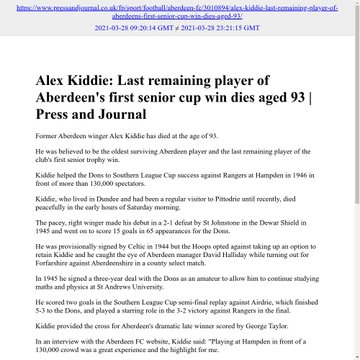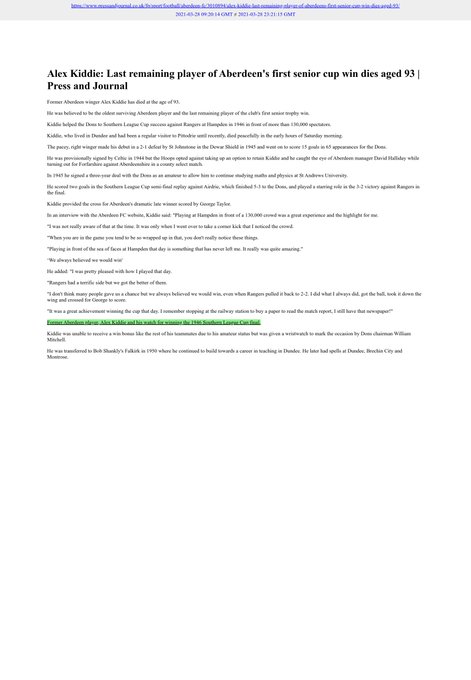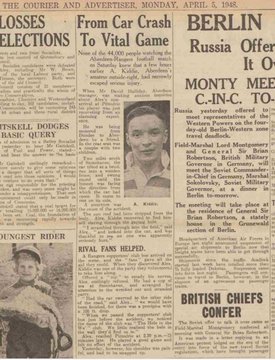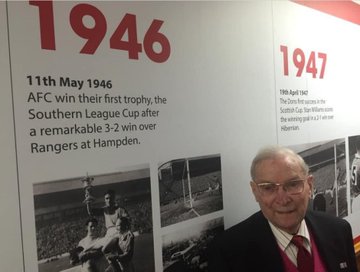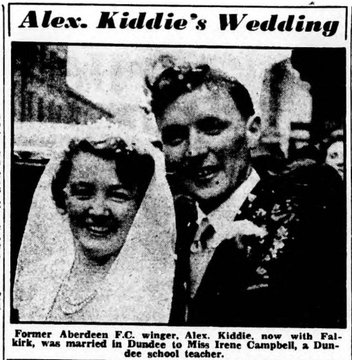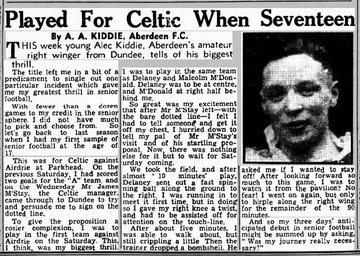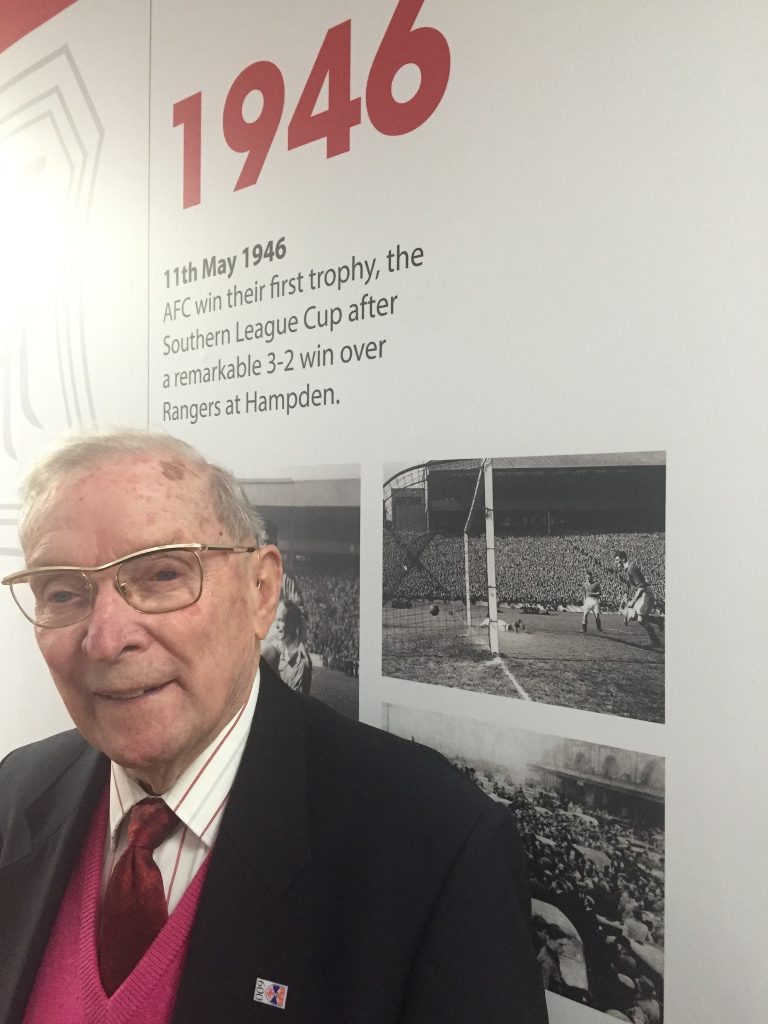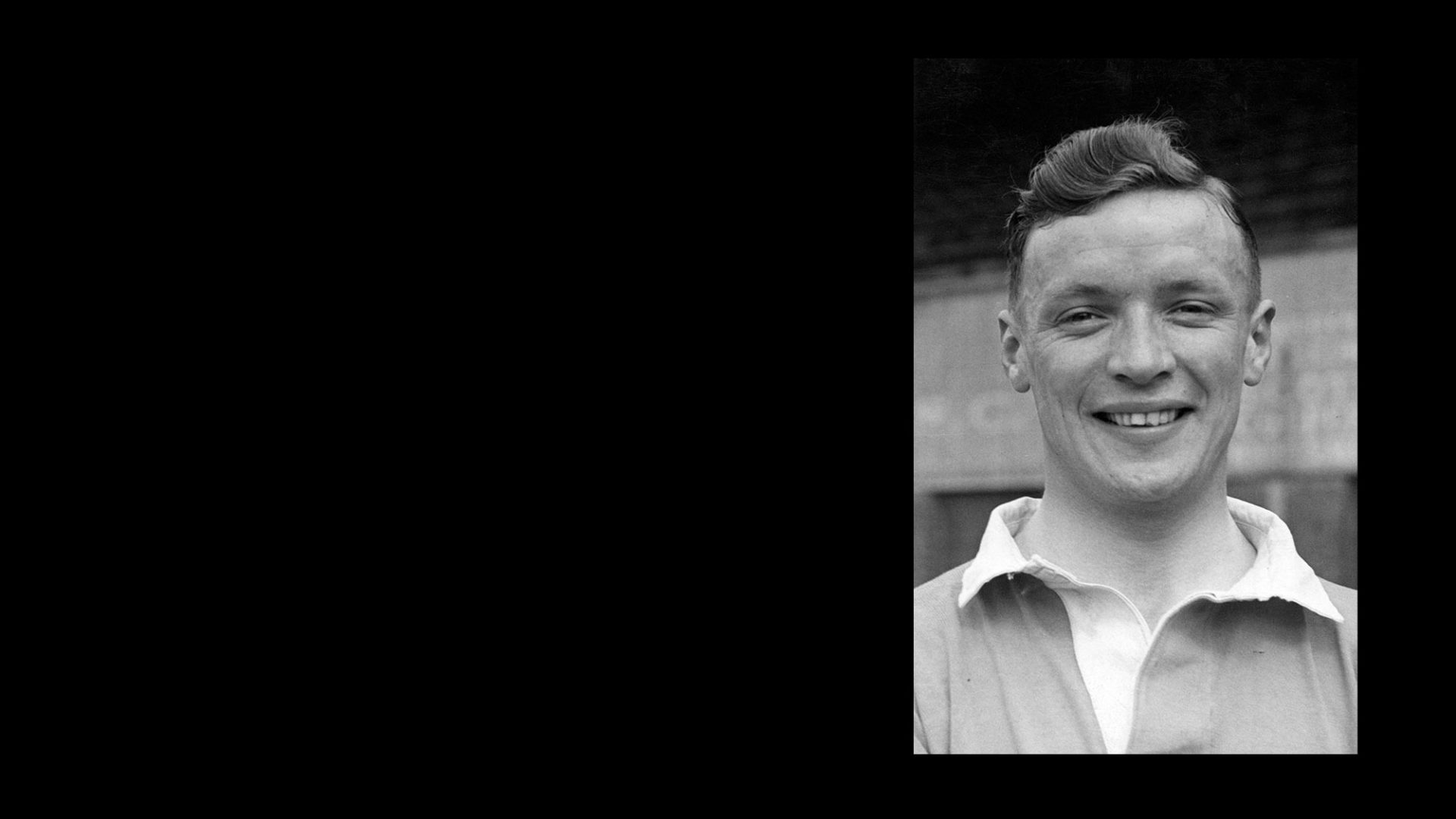| K | Player Pics | A-Z of Players |
Personal
Fullname: Alexander Anderson Kiddie
aka: Alex Kiddie, Alexander Kiddie
Born: 27 April 1927
Died: 27 March 2021
Birthplace: Dundee
Signed: 23 December 1944 (From Dundee Stobswell)
Left: 9 August 1945 (to Aberdeen)
Position: Outside-Right
Debut: Celtic 4-2 Airdrie, Regional League, 28 Oct 1944
Internationals: n/a
Biog
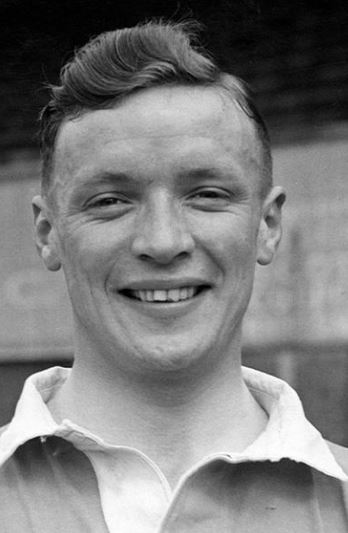 Dundee-born Alex Kiddie signed for Celtic in December 1944 after a successful trial for the Hoops. He was said to have been a schoolboy sensation, and with Celtic’s form during the war years, Celtic needed a miracle.
Dundee-born Alex Kiddie signed for Celtic in December 1944 after a successful trial for the Hoops. He was said to have been a schoolboy sensation, and with Celtic’s form during the war years, Celtic needed a miracle.
It was remarked that he had: “Thrust and speed with clever ball control“.
Signed as an amateur, the speedy outside-right made just two Regional League appearances for the Bhoys. Both of his games were against Airdrie, in the league, with Celtic winning both matches. So a rarity for a Celtic player from back in that era, as he was to leave Celtic with a 100% record. Interestingly, as a reflection of the time, there was a greater attendance at the away game (8000) than at the home game (7000).
Celtic were poor to be with during the war (and for much after also), and his departure from Celtic appears to illustrate further the woeful management at Celtic at that time, so poor circumstances played a part in his lack of appearances.
“The rules stated that clubs had to re-sign players every year. If they didn’t then you were effectively a free agent. I left Celtic that summer and I never heard anything from them so I assumed they would not get in touch.
“After a game for a Forfarshire select against an Aberdeenshire select, Dave Halliday, the Dons boss at the time, asked me to join them. After talking it over with my dad I agreed, but a few days later a neighbour told me a man from Glasgow had come to see me.
“She said I wasn’t in, but he knew I would be playing football for my junior club later on so he said he would see me that evening. So I went and played for Stobswell in what would be my last game for them.
“At half-time the club secretary came over to me and told me Jimmy McGrory of Celtic wanted to see me. Everyone’s mouths fell wide open! We went into the committee room and Mr McGrory told me he had read Aberdeen had signed me and wanted to know if it was true. I told him it was.
“He said Celtic were still interested in me, but I explained I couldn’t come back. But then he said if I signed a contract with them, both contracts would become null and void, meaning I would be suspended — but also become a free agent again, and he promised me that Celtic would sign me after I had served my suspension.
“I told him I couldn’t do it. I had given my word to Aberdeen and that was that. I still don’t regret doing so.”
He moved to Aberdeen in August 1945, where he played his part in helping them win the league cup in 1946 (Aberdeen’s first major trophy) and in destroying Celtic 6-2 at Pittodrie in Aug 1946.
He studied to get a degree in BSc Maths & Physics (St Andrews 1948) to secure his future as a teacher (St Johns, Dundee).
He lived a long life, and was still alive & kicking as the oldest living ex-Celtic first team player until his passing at the grand old age of 93 in 2021.
Playing Career
| APPEARANCES | REGIONAL LEAGUE |
SCOTTISH CUP | LEAGUE CUP | EUROPE | TOTAL |
| 1944-45 | 2 | – | – | – | 2 |
| Goals: | 0 | – | – | – | 0 |
Honours with Celtic
none
Pictures
Links
Articles
Time of my life
Source:www.thescottishsun.co.uk/archives/football/42279/time-of-my-life/
By ROBERT MARTIN
25th October 2010, 11:00 pm
Updated: 26th October 2016, 5:34 pm
AS reliable as Miller and McLeish.
As accurate as Shearer and Harper.
And hands as safe as Leighton and Clark.
Alex Kiddie’s watch has outlasted many of Aberdeen’s greats down the years.
And 64 years after the Dons presented him with the timepiece, like Kiddie himself, it’s still going strong.
Kiddie, now 83, played a pivotal role when the Dons lifted their first major honour back in 1946.
The right winger set up two goals as Aberdeen beat Rangers 3-2 in front of 130,000 fans at Hampden to lift the Southern League Cup.
Tonight Mark McGhee’s Dons hope to take a big step towards landing the trophy in its current form when they face Falkirk in the last eight.
Kiddie was an amateur at the time of the Dons success so they couldn’t give him a small cash sum, like they did with professional players.
Instead chairman William Mitchell asked him if he would like a gift.
And Kiddie, who had turned 19 just two weeks earlier, requested a watch.
Mitchell had it inscribed with Kiddie’s name and the details of the match. And he has worn it ever since.
The former Don, now the last remaining survivor of that historic team, says it still works perfectly to this day.
Kiddie said: “The watch is a perfect memento of my football career and reminds me of many happy times I spent at Aberdeen.
“It was an unusual gift, but I was an amateur at the time and they didn’t know what to give me.
“The professional players got money, but they couldn’t do that with me.
“So the chairman pulled me aside and said they would like to give me the watch and had it inscribed before they presented it to me.
“And from that day in 1946 to now I have worn it all the time — and it has kept perfect time ever since.
“I have had it cleaned a couple of times and on one occasion I had to replace the winder on it.
“But even now it is something I am very proud of, and I remain extremely proud of being part of that team.
“Winning the Southern League Cup, as it was then, was a huge achievement for that Aberdeen team because it was the first major trophy we had ever won.
“We played Rangers at Hampden and I don’t think many people gave us a chance.
“But we scored early through Archie Baird and then went two up when I pulled the ball back for Stan Williams. Rangers came roaring back in the second half and soon pulled level, but we didn’t let that get to us.
“We always believed we could win and in the last minute I got the ball down the wing and crossed for George Taylor to score.
“It remains a huge achievement for the Dons.
“That Rangers team included Jock ‘Tiger’ Shaw, Scott Symon, Willie Waddell, George Young and Willie Thornton.
“They were a fantastic side. But we put one over them.
“And I’ll always remember on my way back from the game stopping to buy a paper and reading the match report at the station. I still have the paper as well.”
Kiddie, though, might have missed out on a place in Dons folklore if Celtic had got their way the year before.
He started his career with the Hoops, but left for Pittodrie after they failed to offer him a new contract.
Kiddie added: “The rules stated that clubs had to re-sign players every year. If they didn’t then you were effectively a free agent.
“I left Celtic that summer and I never heard anything from them so I assumed they would not get in touch.
“After a game for a Forfarshire select against an Aberdeenshire select, Dave Halliday, the Dons boss at the time, asked me to join them.
“After talking it over with my dad I agreed, but a few days later a neighbour told me a man from Glasgow had come to see me.
“She said I wasn’t in, but he knew I would be playing football for my junior club later on so he said he would see me that evening.
“So I went and played for Stobswell in what would be my last game for them.
“At half-time the club secretary came over to me and told me Jimmy McGrory of Celtic wanted to see me. Everyone’s mouths fell wide open!
“We went into the committee room and Mr McGrory told me he had read Aberdeen had signed me and wanted to know if it was true. I told him it was.
“He said Celtic were still interested in me, but I explained I couldn’t come back.
“But then he said if I signed a contract with them, both contracts would become null and void, meaning I would be suspended — but also become a free agent again.
“And he promised me that Celtic would sign me after I had served my suspension.
“I told him I couldn’t do it. I had given my word to Aberdeen and that was that. I still don’t regret doing so.
“After five years at Aberdeen Mr Halliday told me that Falkirk, who were managed by Bob Shankly, had made an offer for me.
“I had two good years at Brockville, but Aberdeen remains the team I have the most affection for.
“We had a cracking team at the time, and it was an honour to be a part of it.”
Aberdeen biog
Source: http://backoffice.afc.co.uk/sotic/player_show.cfm?player_id=10&Season=1949-50
Just after the end of the Second World War, in 1945, Alex signed a three year contract with Aberdeen. He was studying at St Andrews University at the time and playing for Dundee Stobswell and therefore signed as an amateur to give him the freedom to maintain his academic focus – eventually gaining a BSC in Maths and Physics.
The first season at the Club was a transitional one with Aberdeen playing in the Southern League and Alex hit the headlines in April 1946 by scoring two goals in the Southern League Cup semi-final replay victory over Airdrie.
A couple of weeks later he played in the Final of the competition and the Dons triumphed 3-2 against Glasgow Rangers. Once football officially resumed after the war in 46/47 Alex went on to play 48 first team matches and score 13 goals for Aberdeen.
In 1950 Alex was transferred to Falkirk whilst continuing to build a career in teaching in Dundee.Full name: Alexander Anderson Kiddie.
‘Everyone at Celtic Football Club is deeply saddened to hear that Alex Kiddie has passed away’
By Editor 28 March, 2021 No Comments
Celtic confirmed the sad news we heard last night that former Celt Alex Kiddie has passed away, at the age of 93.
“Everyone at Celtic Football Club is deeply saddened to hear that Alex Kiddie has passed away at the age of 93.
Our thoughts and prayers are with his family and friends at this time,” the Celtic condolence message stated.
Everyone at Celtic Football Club is deeply saddened to hear that Alex Kiddie has passed away at the age of 93.
Our thoughts & prayers are with his family and friends at this time. #YNWA pic.twitter.com/FhxlWo6Axo
— Celtic Football Club (@CelticFC) March 28, 2021
For the last few months of his life Alex Kiddie had the status of being the oldest living former Celtic player after the passing of Tommy Docherty on Hogmanay. Matt Corr told Alex Kiddie’s Celtic Story on 3 January…
The sad passing of Tommy Docherty on Hogmanay has triggered some focus on who might now hold the record as the oldest living Celtic player. As far as I can tell – and I am more than happy to stand corrected on this – at 92 years and 8 months the Doc had been the oldest man alive who had played for Celtic in a competitively-recognised match, following his nine appearances for the Hoops in the old Scottish League Division One in season 1948/49.
Some reliable sources on social media have suggested that Alex Kiddie had held – and indeed still holds – that title. So, what do we know about him?
Alexander Anderson Kiddie was born in Dundee on 27 April 1927, almost exactly a year before Tommy Docherty made his entrance in Glasgow on 24 April 1928. Having started his career with the local Ashdale Boys Club, as a highly-rated amateur winger playing in junior football with Dundee Stobswell, the 17-year-old A. A. Kiddie would undergo a successful trial at Celtic Park before signing for the club in December 1944. Kiddie retained his amateur status at Parkhead, in order that he could continue to compete in his other passion, track and field athletics. The Scottish League had been suspended during wartime, as had the Scottish Cup, so only Regional League and Cup matches were played by the country’s senior clubs at that time. These fixtures are usually discounted in terms of official records, hence my reference to ‘competitively-recognised’ in the opening paragraph.
That wonderful source of information all things Celtic, The Celtic Wiki, states that Alex played just two matches for Celts, both against Airdrieonians, presumably in the Southern Regional League in season 1944/45, given that he signed in December 1944 and left the following summer. The problem I have with that is that the first match between the clubs that season took place at Celtic Park on Saturday, 28 October 1944, i.e. some weeks before he was signed. Perhaps he played as a guest or trialist in that game. Sadly, I have no details on the line-up.
In any case, it is a fact that he turned out for the Hoops at Broomfield on Saturday, 3 February 1945, Celtic manager Jimmy McStay choosing the following team.
Celts would win the match 2-1, goals from Joe McLaughlin on the hour and Jackie Gallacher –the son of legendary Scotland striker Hughie Gallacher, whose presence was a major factor in restricting the number of international caps awarded to the great McGrory – 10 minutes later enough to secure the points, despite a late fightback from the hosts. Alex was deputising for another wonderful Celt, Jimmy Delaney, and he seems to have shown up well according to a newspaper account of the match in The Wiki, despite being listed and referred to as ‘Keddie.’
As an aside, at right-back for the Diamonds that day was Frank Brennan, who played beside Ronnie Simpson in the Newcastle United team victorious in the 1952 FA Cup final against Arsenal. And on the left-wing was Pat O’Sullivan, who had scored twice for Airdrieonians in their 4-2 defeat at Celtic Park the previous October, mentioned earlier. Pat signed for Celtic in November 1945, just nine months after the Broomfield clash, however, he and Alex would never be teammates.
At the end of that season, Jimmy McStay’s five-year tenure as Celtic’s second manager had ended, the Parkhead board bringing legendary striker Jimmy McGrory back from Kilmarnock to take over on 1 August 1945. The change of leadership may be one of the reasons that Alex Kiddie’s future at the club appears to have been overlooked or badly-managed, although I have also read that Celtic chose not to take up an option on what was a provisional signing. I’ll let Kiddie himself explain what happened next, courtesy of his quotes in The Celtic Wiki.
“The rules stated that clubs had to re-sign players every year. If they didn’t then you were effectively a free agent. I left Celtic that summer and I never heard anything from them, so I assumed they would not get in touch.
“After a game for a Forfarshire select against an Aberdeenshire select, Dave Halliday, the Dons boss at the time, asked me to join them. After talking it over with my dad, I agreed, but a few days later a neighbour told me a man from Glasgow had come to see me.
“She said I wasn’t in, but he knew I would be playing football for my junior club later on so he said he would see me that evening. So, I went and played for Stobswell, in what would be my last game for them.
“At half-time, the club secretary came over to me and told me Jimmy McGrory of Celtic wanted to see me. Everyone’s mouths fell wide open! We went into the committee room and Mr McGrory told me he had read Aberdeen had signed me and wanted to know if it was true. I told him it was.
“He said Celtic were still interested in me, but I explained I couldn’t come back. But then he said if I signed a contract with them, both contracts would become null and void, meaning I would be suspended — but also become a free agent again, and he promised me that Celtic would sign me after I had served my suspension.
“I told him I couldn’t do it. I had given my word to Aberdeen and that was that. I still don’t regret doing so.”
Having signed a three-year contract as an amateur player at Pittodrie, combining football with his studies at St Andrews University, Alex would quickly become part of Aberdeen folklore. The 1945/46 season would see the Dons become the only club from the north-east of the country to join the top division of the newly-extended wartime Southern League, the final campaign before the national Scottish League set-up was re-introduced in August 1946. Aberdeen would enjoy a fine season, edging Celtic out of third spot to finish behind Hibernian and Rangers, however, it would be in the final edition of the Southern League Cup that Kiddie would create history.
The Dons had dominated the wartime North Eastern League Cup with four wins, whilst Rangers had done likewise in its Southern equivalent. Season 1945/46 would see the two competitions combined for the first time, albeit still under the banner of the Southern League Cup. Aberdeen squeezed through from a tough section which included Hibernian, Partick Thistle and Kilmarnock, with Alex on target in the ultimately decisive 4-1 victory over the Edinburgh side at Pittodrie. Kiddie then scored twice in the 5-3 extra-time win in the replayed semi-final clash with Airdrieonians at Ibrox, to set up a final between the Dons and Rangers at Hampden on Saturday, 11 May 1946. The Ibrox side were clear favourites to add another wartime trophy to their tally.
Southern League Cup final 1946
Before 130,000 spectators on a beautiful sunny afternoon, Aberdeen would build then lose a two-goal lead, Alex having set up the second goal for Stan Williams midway through the first half. In the dying seconds of the match, having earlier watched his shot crash back off the crossbar, he would do likewise for George Taylor, as the Dons won the first national trophy in their history. It would be an occasion he would still recall with some awe in his mid-eighties.
Aberdeen score in the 1946 Southern League Cup final
“Playing in front of the sea of faces at Hampden that day is something that has never left me. How big the crowd was never really struck home until I was setting the ball to take a corner. It gave me the chance to look around myself and I thought ‘my goodness’. It really was quite amazing.”
“Winning the Southern League Cup, as it was then, was a huge achievement for that Aberdeen team because it was the first major trophy we had ever won. We played Rangers at Hampden and I don’t think many people gave us a chance. But we scored early through Archie Baird and then went two up when I pulled the ball back for Stan Williams. Rangers came roaring back in the second half and soon pulled level, but we didn’t let that get to us. We always believed we could win and in the last minute I got the ball down the wing and crossed for George Taylor to score.”
“It remains a huge achievement for the Dons. That Rangers team included Jock ‘Tiger’ Shaw, Scot Symon, Willie Waddell, George Young and Willie Thornton. They were a fantastic side. But we put one over them. I’ll always remember on my way back from the game stopping to buy a newspaper and reading the match report at the station. I still have the paper as well.”
Southern League Cup final 1946 – celebrations
Whilst modest Alex played his part in the historic victory down, admitting only to being “pretty pleased” with his performance, other observers were more forthcoming. Media reports spoke of how “young Kiddie of Aberdeen gave Tiger Shaw a torrid time,” whilst the official club history records the performance as a personal triumph for Kiddie.
“It was the first opportunity for a whole generation of football supporters to visit the national stadium, and when the Aberdeen party arrived in Glasgow, they found the city seething with red and white. That was the day when a slightly-built lad from Dundee, who was generally referred to as A.A.Kiddie, played the game of his life, turning his own dream-like performance into a nightmare for Rangers left-back stalwart Tiger Shaw, who was not accustomed to chasing shadows.”
Aberdeen with the Southern League Cup in 1946. Alex Kiddie is front left.
In another of those strange quirks that football so often throws up, in August 1948 that same Tiger Shaw would be the direct opponent of 20-year-old Celtic debutant, Tommy Docherty, whilst Scot Symon would be his manager at Preston North End when The Doc played in the FA Cup final at Wembley, six years later.
There is a lovely anecdote, which can serve as a footnote to this game. As an amateur, Alex would not be able to receive the cash bonus offered to his teammates for winning the cup. Instead, he received an engraved watch, which was still going strong in October 2010, more than 64 years later. Over to Alex again.
“The watch is a perfect memento of my football career and reminds me of many happy times I spent at Aberdeen. It was an unusual gift, but I was an amateur at the time and they didn’t know what to give me. The professional players got money, but they couldn’t do that with me. So, the chairman pulled me aside and said they would like to give me the watch and had it inscribed before they presented it to me. And from that day in 1946 to now I have worn it all the time, and it has kept perfect time ever since. I have had it cleaned a couple of times and on one occasion I had to replace the winder on it. But even now it is something I am very proud of, and I remain extremely proud of being part of that team.”
Many of those teammates would return to Hampden twice within a fortnight the following April, as Dave Halliday led the Dons to the inaugural League Cup final then the Scottish Cup finale. The first match would see Rangers take some revenge for their defeat a year earlier by winning 4-0 in front of a mere 83,000 crowd, however, two weeks later, a similar number watched Aberdeen beat Hibernian 2-1 to lift a first-ever Scottish Cup. Sadly for Alex, on both occasions Tony Harris occupied his right-wing berth.
Alec Kiddie,Jim Gourlay and Hugh McVean at Dundee 1948 (LtoR)
Kiddie would manage 13 goals in 48 appearances for Aberdeen before signing for Bob Shankly at Falkirk in 1950. He would later return to his native city to sign for Dundee then enjoy spells with Angus sides, Arbroath, Brechin City, Montrose and Forfar Athletic. It is therefore entirely possible that Alex is the oldest surviving player for no fewer than eight Scottish senior clubs!
Whilst Alex may well be the oldest man to pull on the Hoops in any competition, it would be interesting to see who picks up the mantle from Tommy Docherty in terms of competitive matches. The first such match played by Celtic after the war was a home League fixture against Morton on Saturday, 10 August 1946, however, assuming The Doc did indeed hold the honour with his nine appearances in season 1948/49, then perhaps we are looking at someone who was a young Celtic player in the early 1950s. With the incredible Hoops knowledge which exists online, hopefully, someone will come up with a name.
Thanks as always to the wonderful folk behind The Celtic Wiki and also credit to Charlie Allan of the Aberdeen FC Former Players Association for an article he did on Alex’s 93rd birthday.
Matt Corr
Our condolences to Alex’s family and friends. Alex Kiddie, YNWA. Requiescat in pace.
In memoriam | Alex Kiddie
March 27, 2021 4:13 pm Author: redmatchday team (Kevin Stirling, Charlie Allan, Malcolm Panton)
https://www.afc.co.uk/2021/03/27/in-memoriam-alex-kiddie/
Everyone at Aberdeen Football Club is deeply saddened to hear that Alex Kiddie has passed away at the age of 93.
To our knowledge Alex was the oldest surviving Dons player and the final link to the club’s first ever senior trophy. The winger played a starring role in the side that won the 1946 Southern League Cup against Rangers at Hampden Park in front of over 130,000.
Until quite recently he was still a regular and very popular visitor to Pittodrie. Alex passed away peaceful in the early hours of Saturday morning. On behalf of everyone at AFC, our thoughts are with Alex’s wife Norma, his son and good friend of the club Paul, daughter-in-law Margaret, granddaugher Caitlin, grandson Michael, and all the family at this difficult time.
Rest in Peace Alex.
The Alex Kiddie Story
Alexander Anderson Kiddie was born on the 27th April 1927, Alex was the only remaining player in the Aberdeen side that won the Southern League Cup in 1946.
Alex started out with Ashdale Boys in his native Dundee before joining Stobshill Juniors where the likes of George Merchant of Falkirk Scottish Cup fame played as well as Reggie Smith. As a right winger of great speed, Alex would become familiar with his role.
“Getting past players and crossing the ball was what it was all about in those days.” That was the first occasion Alex came across well known professional players and his career was about to take a turn for the better after he was provisionally signed by Celtic in 1944 as the war in Europe continued.
“Jimmy McStay took me to Celtic and I was there for a year before they did not take up the option to retain me.”
Alex then returned to the east coast and he was then selected to play for Forfarshire against Aberdeenshire in a county select representative match; “I was 18 at the time and it was a great thrill to play in a game like that. Little did I know but Aberdeen manager Dave Halliday was there watching the game.”
Signing
Halliday was renowned for personally scouting new players and was a frequent visitor to such games. Halliday was in the process of building a new Aberdeen side as the war ended as many of his squad were now in the veteran stage of their careers. Exciting new talent was required and Alex Kiddie made enough of an impression for Halliday to approach him after the game; “Dave Halliday came up to me and told me that he was impressed and liked what he saw. He asked if I would like to join Aberdeen. It was a great opportunity for me and I agreed.
After signing for Aberdeen in 1945 in the immediate aftermath of the war, Alex was given a three-year contract; highly unusual in those days but as Alex explained; “I was signed as an amateur by Aberdeen, and the length of the deal would be three years. I wanted that so I could also devote my time to studying at University.”
There was no need for any contract negotiations and all that as I committed to sign for three years as an amateur. At that time I was very much looking towards my studies. I was learning at St Andrews University and was studying for my BSC in Maths & Physics.
Celtic
There was however a last gasp attempt by Celtic to scupper the deal for the then 18-year-old winger.
“I had never heard anything from Celtic after leaving them that summer, so assumed they wouldn’t be getting in touch. After talking things over with my dad, I agreed to join Aberdeen. A few days later a neighbour told me a man from Glasgow had come to see me. She said I wasn’t in but knew I’d be playing for my Junior club later so he told her he would be back to see me.
“That was my last game for Stobswell and at half-time the club secretary told me Jimmy McGrory (Celtic’s manager) wanted to see me. Everyone’s mouths fell wide open when they heard that!
“We went into the committee room and Mr McGrory told me he had heard Aberdeen had signed me and wanted to know if it was true. I told him it was and he insisted Celtic were still interested but I said I couldn’t go back. He then said if I also signed a contract with them, both would become null and void, meaning I would be suspended and I’d become a free agent again. He promised Celtic would sign me after I served my suspension but I told him I had given my word to Aberdeen and that was that.”
Alex’s show of loyalty was even more remarkable because he had joined the Dons as an amateur player.
Amateur
“I was also active as a sprinter on the athletics field and did well in the long jump, which is why I chose not to go professional. I got my expenses covered but that was it. I didn’t care though because I loved playing for Aberdeen.”
The leap that Alex took to Pittodrie may not have been so daunting as he had gained some experience before joining the Dons. The official records show that Alex made his competitive debut for Aberdeen along with Tony Harris, Archie Baird and Billy McCall against Third Lanark at Cathkin Park on 19th August 1946 in a 3-0 win. Due to the war and the cessation of all official football during those times, season 1946.47 was the first official season of the Scottish League since the end of hostilities. However, in what would be best described as a ‘makeshift’ season in 1945.46, it was Aberdeen and Alex who made their mark on the national stage. Alex first played for Aberdeen in a Dewar shield tie against St Johnstone in Perth on 15th August 1946.
With the Dons competing in the ‘Southern A’ Division that season, Aberdeen competed well to finish in third place behind Rangers and Hibernian. The Scottish League were mindful of the need to return to some kind of normality and the introduction of the Southern League Cup competition was the forerunner to the League Cup we know today.
The Southern League Cup
The Southern League Cup was a regional competition held during the Second World War. It was dominated by Rangers, who won it in 1941, 42, 43 and 45, with Hibs the only side to break their grip on the trophy. When the war ended, the competition was expanded to include teams from the north of Scotland as well, which is how Aberdeen came to be involved.
Aberdeen marched on to reach the final of the competition in style, scoring 19 goals in the process. Two of those goals came from Alex in the semi final replay against Airdrie at Ibrox. The sides had battled out a 2-2 draw in the first game and the replay went to extra time as Aberdeen won a sensational tie 5-3 to reach the Hampden final. It was Alex’s two goals in that dramatic tie that eventually paved the way for the Dons success.
That win took Aberdeen to the Final showdown against holders Rangers on May 11, 1946, and provided Alex with his finest hour in football; “Playing at Hampden in front of a 130,000 crowd was a great experience and the highlight for me. I was not really aware of that at the time. It was only when I went over to take a corner kick that I noticed the crowd. When you are in the game you tend to be so wrapped up in that, you don’t really notice these things. Playing in front of the sea of faces at Hampden that day is something that has never left me. It really was quite amazing.”
“We were up against Rangers and were not expected to win. I suppose that suited us as we had been in good form that season although we were a relatively new team.” Alex may still retain a modest outlook to what happened that day but his contribution to the game was crucial; “It was a warm day at Hampden and the crowd was barely settled when we took the lead.
A long throw from Andy Cowie was knocked on to Archie Baird whose header put Aberdeen ahead. It was after 18 minutes that Alex had a telling contribution after dispossessing the famed Rangers full back ‘Tiger’ Shaw (brother of Dons boss Dave Shaw); “I managed to win the ball and set off down the wing. I could see we had support in the middle so i was keen to get the ball over.” Alex crossed for George Hamilton who in turn set up Stan Williams to hammer the ball past Rangers keeper John Shaw to put Aberdeen two goals ahead.
The expected Rangers comeback did materialise in the second half but when it was 2-1 it could have been all over when Alex rattled the Rangers crossbar after tormenting Shaw once more. Despite dominating the game, Rangers drew level with 20 minutes to go. That set the stage for one last effort from the Dons; “It was almost time up when I got the ball on the right. I made one last effort to get to the bye-line. I crossed the ball over into the box and fortunately George Taylor was in a good position to score. It was an incredible feeling. The ball returned to the centre circle and after Rangers re-started the referee blew for full time.
The Reaction
That competition elevated Alex and Aberdeen to new heights as it was the Dons first success on the national stage; albeit classed as an ‘unofficial’ season by the authorities.
Legendary Aberdeen journalist Jack Webster, who was just a teenager himself when the final was played, wrote about it his book ‘The Dons’ – the official history of the club, which was first published in 1978.
Jack wrote: “It was the first opportunity for a whole generation of football supporters to visit the national stadium and when the Aberdeen party arrived in Glasgow they found the city seething with red and white.
“That was the day when a slightly built lad from Dundee, who was generally referred to as A.A.Kiddie, played the game of his life, turning his own dream-like performance into a nightmare for Rangers left-back stalwart Tiger Shaw, who was not accustomed to chasing shadows.”
Jack Webster, who listened to final live on BBC radio back in Aberdeen, continued:
“The game had entered its very last minute and the atmosphere was felt not only on the slopes of Hampden Park but in places like the common room of Gordon’s College boarding house at Queen’s Road, where a group of us were clustered around the wireless set, as we called it then, hanging on every word of BBC commentator Peter Thomson.
“He had checked his watch his watch for the number of dying seconds when suddenly Aberdeen were on the attack, the ball had been crossed by Kiddie… Cowie was going for it… Hamilton was going for it… George Taylor was going for it…”
Mementos
It was to be an afternoon when Alex produced one of his best ever performances in an Aberdeen shirt, despite the fact he was still a teenager and up against Rangers greats like Jock ‘Tiger’ Shaw, Willie Waddell, Scot Symon, George Young and Willie Thornton.
Newspaper reports of the time also talk of how ‘young Kiddie of Aberdeen’ gave Tiger Shaw a ‘torrid time.’
“I was pretty pleased with how I played that day. Rangers had a terrific side but we got the better of them. I don’t think many people gave us a chance but we always believed we would win, even when Rangers pulled it back to 2-2. I did what always did, got the ball, took it down the wing and crossed for George to score.
“It was a great achievement winning the cup that day. I remember stopping at the railway station to buy a paper to read the match report, I still have that newspaper!”
As the only amateur to play in the final, Alex was unable to share in the win bonus the Dons directors gave to their cup winning squad. Aberdeen chairman William Mitchell asked what he would like instead to mark the occasion – and Alex chose a wristwatch.
“As an amateur, I was not entitled to any cash bonus. After the game the Aberdeen chairman William Mitchell expressed his gratitude at my performance and told me that the club would see about rewarding me for my efforts. That came in the shape of a watch that was given to me by the club and engraved on the back; ‘A.A Kiddie Southern League Cup 1945.46.’ The watch has remained with me ever since and is still keeping perfect time all those years later!”
“I had never owned a watch before so I was delighted. Not getting a bonus never worried me. Winning the cup was reward enough. The watch was a very kind gesture by the club and I’ve been proud to wear it almost every day since. it’s one of my most treasured possessions.”
1946 onwards
Alex continued to play as an amateur for a further two years while completing his studies. His at Pittodrie was split between his time at St Andrew’s University where he gained his BSC in Maths & Physics. That allowed Alex to continue to play as an amateur and also his football career, although he moved on from Aberdeen in 1948 after 65 appearances and 15 goals:
“I took up a teaching position at St John’s School in Dundee where I was appointed Principal Teacher. I was transferred from Aberdeen to Falkirk in 1950 where I met Ralph McKenzie who had also been with Aberdeen. It was later that I was transferred to Dundee on a temporary basis. George Anderson, the former Aberdeen keeper was manager at Dens then. Having won the cup in 1946 I was invited to play a Dundee side in Bob McGlashan’s benefit match at Gayfield. Included in the Aberdeen side that day was Doug Cowie. He never did join the Dons and it was George Anderson who took him to Dundee. Cowie went on to become a Dens Park legend of course.”
Alex finished his playing career with Brechin City in 1954 and at Montrose a year later. Alex was part of the Brechin side that won the ‘C’ Division title; “That was a great achievement for Brechin although it was a reserve league, these divisions were very strong back then and we beat the likes of the powerful Aberdeen and Dundee ‘A’ sides to take the championship. I finished up at Montrose where George Hill was the manager.”
Affection
Looking back on his Pittodrie days, Alex recalls some great players; “George Johnstone was a great keeper and very commanding. Willie Cooper was another one who would never let you down and he was always good for a dozen or so eggs during the rationing days; never knew where he got them from, but I never cared to ask! I also visited Pat McKenna and Archie Glen several years ago and it was a pity to see them both suffer from dementia in later life. Archie Baird was a great player and remained a close friend. I helped him celebrate his 90th birthday.
“I always appreciated the opportunity Aberdeen gave to me. I retain a lot of affection for the club because it was a special time and an honour to be part of the team which won the first major trophy.”
Alex Kiddie enjoyed his retirement after a career as a respected teacher and footballer in his native Dundee. In an era when playing football was secondary to following a profession away from the game, the commitment given to the game by the likes of Alex Kiddie is admirable; if ever there was a Hall of Fame for unsung heroes, then Alex would be the ideal candidate.
Former Aberdeen winger Alex Kiddie has died at the age of 93.
https://www.pressandjournal.co.uk/fp/sport/football/aberdeen-fc/3010894/alex-kiddie-last-remaining-player-of-aberdeens-first-senior-cup-win-dies-aged-93/
He was believed to be the oldest surviving Aberdeen player and the last remaining player of the club’s first senior trophy win.
Kiddie helped the Dons to Southern League Cup success against Rangers at Hampden in 1946 in front of more than 130,000 spectators.
Kiddie, who lived in Dundee and had been a regular visitor to Pittodrie until recently, died peacefully in the early hours of Saturday morning.
The pacey, right winger made his debut in a 2-1 defeat by St Johnstone in the Dewar Shield in 1945 and went on to score 15 goals in 65 appearances for the Dons.
He was provisionally signed by Celtic in 1944 but the Hoops opted against taking up an option to retain Kiddie and he caught the eye of Aberdeen manager David Halliday while turning out for Forfarshire against Aberdeenshire in a county select match.
In 1945 he signed a three-year deal with the Dons as an amateur to allow him to continue studying maths and physics at St Andrews University.
Everyone at Aberdeen Football Club is deeply saddened to hear that Alex Kiddie has passed away at the age of 93.
To our knowledge Alex was the oldest surviving Dons player and the final link to the club’s first trophy.
RIP Alex
— Aberdeen FC (@AberdeenFC) March 27, 2021
He scored two goals in the Southern League Cup semi-final replay against Airdrie, which finished 5-3 to the Dons, and played a starring role in the 3-2 victory against Rangers in the final.
Kiddie provided the cross for Aberdeen’s dramatic late winner scored by George Taylor.
In an interview with the Aberdeen FC website, Kiddie said: “Playing at Hampden in front of a 130,000 crowd was a great experience and the highlight for me.
“I was not really aware of that at the time. It was only when I went over to take a corner kick that I noticed the crowd.
“When you are in the game you tend to be so wrapped up in that, you don’t really notice these things.
“Playing in front of the sea of faces at Hampden that day is something that has never left me. It really was quite amazing.”
‘We always believed we would win’
He added: “I was pretty pleased with how I played that day.
“Rangers had a terrific side but we got the better of them.
“I don’t think many people gave us a chance but we always believed we would win, even when Rangers pulled it back to 2-2. I did what I always did, got the ball, took it down the wing and crossed for George to score.
“It was a great achievement winning the cup that day. I remember stopping at the railway station to buy a paper to read the match report, I still have that newspaper!”
Former Aberdeen player, Alex Kiddie and his watch for winning the 1946 Southern League Cup final.
Kiddie was unable to receive a win bonus like the rest of his teammates due to his amateur status but was given a wristwatch to mark the occasion by Dons chairman William Mitchell.
He was transferred to Bob Shankly’s Falkirk in 1950 where he continued to build towards a career in teaching in Dundee. He later had spells at Dundee, Brechin City and Montrose.

